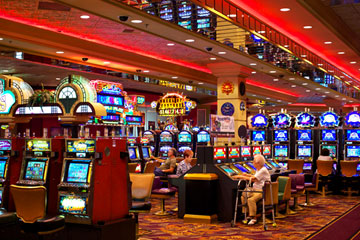
Las Vegas local, Eleanor Kochanski, center right, plays one cent machines in the Penny Lane area of The Orleans casino, in Las Vegas on Wednesday, June 26, 2013.
(2 of 6)
"My theory is that when people had a ton of money in their portfolio, they felt like geniuses," says Professor David Schwartz, head of the Center for Gaming Research at the University of Nevada at Las Vegas. "I wake up every morning and I'm richer, a lucky person and a good gambler." It's not all theory. Every dollar of added value in your home or investment portfolio triggers a few cents of new spending a few months down the road--what economists call the wealth effect. While 91% of the total household wealth lost during the crisis has been recovered, according to the St. Louis Federal Reserve, that recovery has been uneven: the richest households, more heavily invested in stocks, lost the most and regained the most. Adjusting for inflation and population growth, the average household has recovered only about 45% of its wealth--which doesn't help spending or risk taking.
Consumer caution is one of the reasons the economy has been stuck in slow-growth mode, with GDP increasing just 1.7% in the most recent quarter. You can see that caution in consumer spending, which is grudging. You can see it in consumer saving too. Mutual-fund investors pulled billions of dollars out of equities for four years running until early this year, missing a huge jackpot as the market reached record levels. Stocks compensate for risk better than roulette tables do, so if scarred consumers are unwilling to invest in Wall Street, it's not necessarily surprising that when they come to Vegas, they are betting less, playing different games--or not playing at all. "If you were to ask me if I gambled more or less, I'd say I probably gambled less than last year," says Steven Scheft, after a recent eight-day visit that passed with only an occasional stop at the blackjack or craps table.
Passing Up the Tables
This is probably not what Steve Wynn had in mind when he spent $5 billion on the lavishly appointed Wynn and Encore properties. In early May, Wynn, the CEO of Wynn Resorts, ambled out of a closed-door session with Nevada's legislators and was asked by a local reporter what wisdom he had for the Silver State solons. "Right now the gambling industry has a serious health problem," he reported. For instance, table games such as baccarat, blackjack and craps used to represent 80% to 90% of the casinos' revenue and earnings. Since the meltdown, the casinos have become ever more reliant on slots, where the "hold" (the percentage of bets the house keeps) has been dwindling. Slots now represent 50% to 60% of revenue and 75% of gross profit, says Dean M. Macomber, an industry consultant and former gambling executive.
